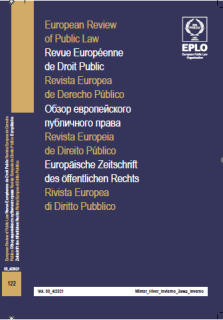
Constitutional Law / Droit constitutionnel
Greece / Grèce
DPhil, Law (Oxon), Greek Ombudsman, President of IOI-Europe and AOM,
Deputy Director of the Academy of European Public Law
The reformation of Greek Family Law that took place in 1983 was, for its time, a paradigm shift. It responded with considerable ambition to the demands of its time for social transformation by creating a new and modern family model, scrapping the dominant position and absolute authority of the husband/father, and replacing it with a more equitable, balanced role for the married couple, both in their parental rights and duties as well as in their relationship as husband and wife. This family model, based on a more or less balanced sharing of authority and parental responsibility among the parents, was, however, restricted to family units within wedlock, and did not extend to family units outside marriage, either after its dissolution/divorce or in the absence of it. Thus, while shared parenting within a marriage was legally recognized, and progressively became the norm, this was not the case for divorced families or families who never entered wedlock. In those families, children remained mainly or exclusively under the custody of one parent, most commonly if not exclusively, the mother, and only secondarily the other parent. Communication of the parent who did not live with the child was perceived as a right of the parent and not as an obligation, often violated by the parent who lived with the child, to such an extent, in fact, that it quickly grew into an acute social problem. And yet, in the intervening period of nearly four decades, there was a remarkable, and unjustified legislative inaction. This legislative inaction was eventually interrupted by Law 4800/2021, which purported to remedy the shortcomings of the law of the 1980s in relation to children being brought up outside wedlock, and to attune Greek Family Law to the provisions of the 1989 United Nations Convention on the Rights of the Child that proclaims the best interest of the child as the core, fundamental principle for any decision affecting it. It remains to be seen, in the years to come, to what extent the legislative reforms introduced with the recent Law 4800/2021 will be embraced by parents and affect a major jurisprudential shift, so that they may merit the prominence of a (new) paradigm shift.
La réforme du droit familial grec qui a eu lieu en 1983 a représenté, pour l’époque, un changement de paradigme. Elle a répondu avec beaucoup d’ambition aux demandes de transformation sociale de l’époque en créant un modèle familial nouveau et moderne, en supprimant la position dominante et l’autorité absolue du mari/père et en la remplaçant par un rôle plus équitable et équilibré pour le couple marié, tant dans ses droits et devoirs parentaux que dans sa relation en tant que mari et femme. Ce modèle familial, fondé sur un partage plus ou moins équilibré de l’autorité et de la responsabilité parentale entre les parents, était toutefois limité aux unités familiales au sein du mariage et ne s’étendait pas aux unités familiales hors mariage, que ce soit après sa dissolution/divorce ou en l’absence de celui-ci. Ainsi, si le partage des responsabilités parentales au sein du mariage était légalement reconnu et est devenu progressivement la norme, ce n’était pas le cas pour les familles divorcées ou les familles qui n’avaient jamais contracté de mariage. Dans ces familles, les enfants restaient principalement ou exclusivement sous la garde d’un parent, le plus souvent, sinon exclusivement, la mère, et secondairement seulement, l’autre parent. Le droit de visite du parent qui ne vivait pas avec l’enfant était perçu comme un droit du parent et non comme une obligation, souvent violée par le parent qui vivait avec l’enfant, à tel point, en fait, que cela est rapidement devenu un problème social majeur. Pourtant, les presque quatre décennies écoulées depuis ont été marquées par une inaction législative remarquable et injustifiée. Celle-ci a finalement été interrompue par la loi 4800/2021, qui visait à remédier aux lacunes de la loi des années 1980 en ce qui concerne les enfants élevés hors mariage, et à adapter le droit familial grec aux dispositions de la Convention des Nations unies sur les droits de l’enfant de 1989, qui pose l’intérêt supérieur de l’enfant en principe fondamental de toute décision le concernant. Il reste à voir, dans les années à venir, dans quelle mesure les réformes législatives introduites par la récente loi 4800/2021 seront adoptées par les parents et entraîneront un changement jurisprudentiel majeur, de sorte à mériter qu’on y voie un (nouveau) changement de paradigme.





















